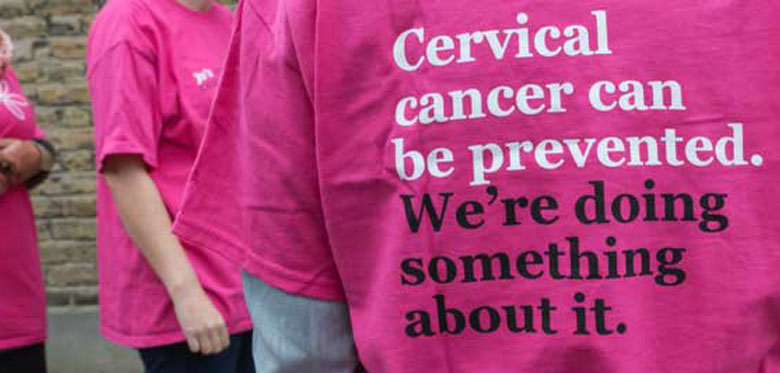Nine women are diagnosed with cervical cancer in the UK every day and three women will lose their lives to the disease each day. Thanks to cervical screening and the HPV vaccination programme, cervical cancer is now largely preventable – with 75% of cervical cancers being prevented by cervical screening - although uptake of cervical screening is now going down every year.
Every year in the UK, around 3,000 women will be diagnosed with cervical cancer. Cervical cancer is the most common cancer in women aged 35 and under.
Cervical cancer is not thought to be hereditary. In 99.7% of cases, cervical cancers are caused by persistent infections with a virus called high-risk human papillomavirus (HPV). HPV is a very common virus transmitted through skin to skin contact in the genital area. Around four out of five sexually active adults (80%) will be infected with some type of HPV in their lives. However, for the majority of women this will not result in cervical cancer. While HPV infection is common, cervical cancer is quite rare.
The ‘Jade Goody effect’ from 2009 a report from the Journal of Medical Screening noted that media coverage of celebrity illness triggers a 'cause and effect’ type situation. Following the tragic death of Jade, aged just 27, this caused a positive effect on the take-up of cervical screening after the substantive media coverage of Jade Goody's public battle against cervical cancer.
Jade Goody was part of that hard-to-reach age group - women aged 25-35 - and because Jade was a woman who wore her heart on her sleeve, made some very public mistakes and spoke her mind freely, her circumstances created an identifiable event which was far more effective than a national campaign or a fact sheet had ever done before.
At the peak of the ‘Jade Goody effect’ in March 2009, attendance was 70% higher than expected at cervical screening appointments. Increases were seen in both initial and follow-up screening attendances and in colposcopy attendances, and at all ages, though the magnitude was greater for women aged under 50.
The pattern of increased attendance mirrored the pattern of media coverage of Jade Goody's diagnosis and death. It is most likely that the increased screening resulted in a number of lives saved.
Fast forward nine years and the Jade Goody effect is wearing off. Across the UK cervical screening figures have fallen with more than 1.2 million women not taking action on their reminder for a smear test - a 20-year low. Because of our wonderful National Health Service, the smear test is free, is available to all women over the age of 25 (and to any sexually active woman of any age, upon request) and we are advised to have our smear test at least once every three years.
As we all lead such busy lives these days fitting in a five minute appointment sometimes can feel an impossible task, especially when GP surgery hours usually clash with work and family commitments.
However, cervical cancer can be prevented by making more woman aware of its importance and in order to achieve this greater awareness woman should:
- Attend cervical screening when invited by their health practitioner
- Be aware of the symptoms of cervical cancer and seek medical advice if experiencing any symptoms
- Take up the HPV vaccination if aged 11-18 when offered
- Talk to family and friends to ensure they know how they can reduce their risk and prevent cancer occurring
- Know locally where to find support and further information which will be widely available at your GP and local family planning clinic
By Alex Penk, graduate paralegal in the personal injury department



Comments